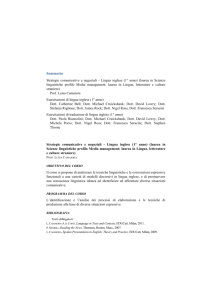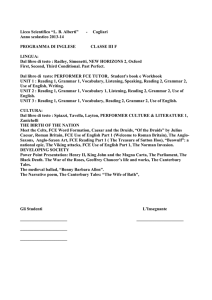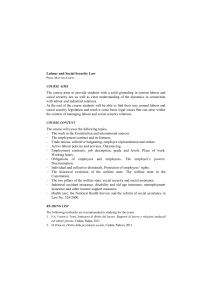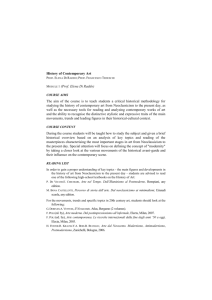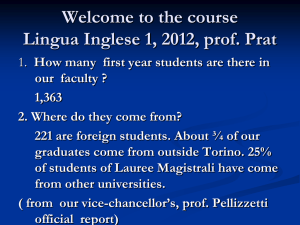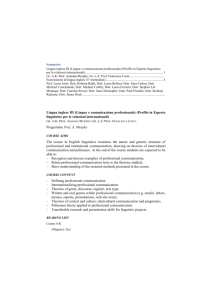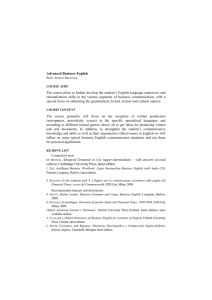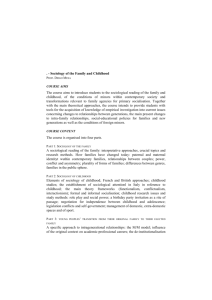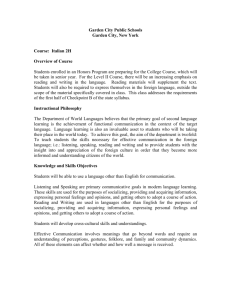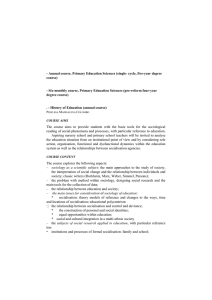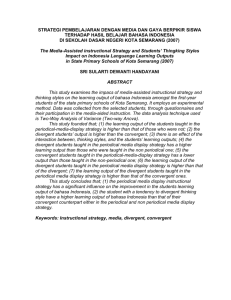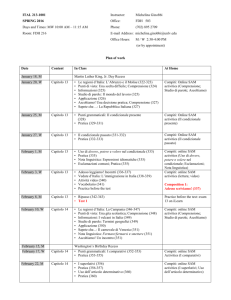lingua inglese per altri corsi di laurea
advertisement
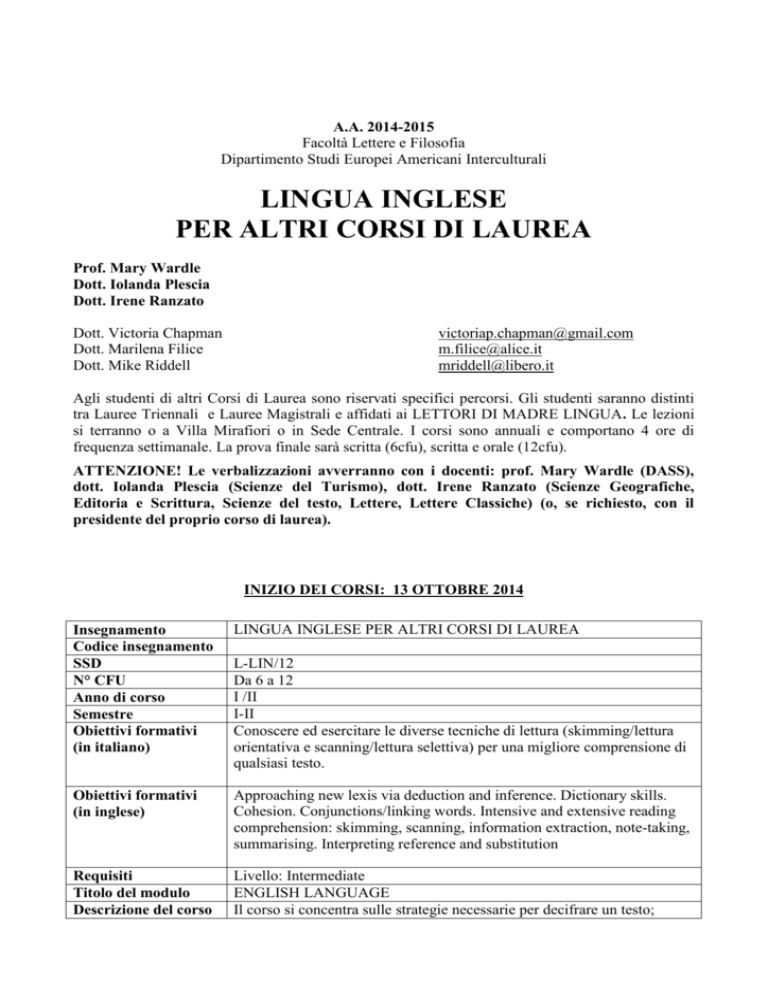
A.A. 2014-2015 Facoltà Lettere e Filosofia Dipartimento Studi Europei Americani Interculturali LINGUA INGLESE PER ALTRI CORSI DI LAUREA Prof. Mary Wardle Dott. Iolanda Plescia Dott. Irene Ranzato Dott. Victoria Chapman Dott. Marilena Filice Dott. Mike Riddell victoriap.chapman@gmail.com m.filice@alice.it mriddell@libero.it Agli studenti di altri Corsi di Laurea sono riservati specifici percorsi. Gli studenti saranno distinti tra Lauree Triennali e Lauree Magistrali e affidati ai LETTORI DI MADRE LINGUA. Le lezioni si terranno o a Villa Mirafiori o in Sede Centrale. I corsi sono annuali e comportano 4 ore di frequenza settimanale. La prova finale sarà scritta (6cfu), scritta e orale (12cfu). ATTENZIONE! Le verbalizzazioni avverranno con i docenti: prof. Mary Wardle (DASS), dott. Iolanda Plescia (Scienze del Turismo), dott. Irene Ranzato (Scienze Geografiche, Editoria e Scrittura, Scienze del testo, Lettere, Lettere Classiche) (o, se richiesto, con il presidente del proprio corso di laurea). INIZIO DEI CORSI: 13 OTTOBRE 2014 Insegnamento Codice insegnamento SSD N° CFU Anno di corso Semestre Obiettivi formativi (in italiano) LINGUA INGLESE PER ALTRI CORSI DI LAUREA Obiettivi formativi (in inglese) Approaching new lexis via deduction and inference. Dictionary skills. Cohesion. Conjunctions/linking words. Intensive and extensive reading comprehension: skimming, scanning, information extraction, note-taking, summarising. Interpreting reference and substitution Requisiti Titolo del modulo Descrizione del corso Livello: Intermediate ENGLISH LANGUAGE Il corso si concentra sulle strategie necessarie per decifrare un testo; L-LIN/12 Da 6 a 12 I /II I-II Conoscere ed esercitare le diverse tecniche di lettura (skimming/lettura orientativa e scanning/lettura selettiva) per una migliore comprensione di qualsiasi testo. queste includono inferire il significato di un termine dal contesto, capire vari aspetti del sistema lessicale, riconoscere le forme grammaticali più complesse e le strutture coesive nell’interno di un testo. Modalità di insegnamento Modalità di valutazione Orario, luogo Bibliografia Lezioni frontali (consigliata la frequenza) Prova scritta e orale Villa Mirafiori: giorni, ora, aula (vedi prospetto) Materiali didattici ed esercitazioni saranno distribuiti durante il corso LINGUA INGLESE PER ALTRI CORSI DI LAUREA TRIENNIO Lettore Riddell Corso F1 Orari da definire Aula SEDE CENTRALE Chapman F2 DASS Chapman F3 DASS lunedì 18,15-20,00 venerdì 8,30-10,30 giovedì 16,30-18,30 venerdì 10,30-12,30 VI V XIII V Filice F4 TURISMO studenti A-L lunedì 8,30-10,30 sabato 8,30-10,30 lunedì 10,30-12,30 sabato 10,30-12,30 VII III VIII III da definire SEDE CENTRALE studenti M-Z MAGISTRALE Riddell F5 Programmi dei corsi VICTORIA CHAPMAN LT - ARTI E SCIENZE DELLO SPETTACOLO The first-year English language course aims to improve students’ listening, speaking, reading and writing skills and knowledge of grammar to an Intermediate ( B1) level and beyond. Bibliography Clive Oxenden, Christina Latham-Koenig, New English File Intermediate Student’s Book and Workbook (with key), Oxford University Press, Oxford, 2006 Additional grammar book for self-study: (optional) Raymond Murphy, English Grammar in Use with answers (Intermediate), Cambridge Univ. Press, Or Anna Amendolagine, Norman Coe, Mark Harrison, Ken Patterson, Grammar Spectrum for Italian Students (Student Pack with key), Oxford University Press Or John Hird, The Complete English Grammar for Italian Students with Key, Oxford University Press Notes Attending Lessons – If you can’t attend lessons speak to one of the teachers and we can indicate the correct programme for you to study. If you miss a lesson find out from other students what we have done and study it. Try to participate actively in the lessons. Organize your time and organize your learning. Organized notes are easier to refer to and to revise from. Beyond the book you are asked to read it is your responsibility to find more things to read: English newspapers, magazines etc. are good sources of short articles. We will also organize conversation groups with American students from the University of California who are doing a year abroad in Rome. This is an excellent opportunity to speak with native speakers. The Internet is a fabulous resource for both listening and reading material, so use it! I strongly recommend this site, particularly for listening: http://www.bbc.co.uk/worldservice/learningenglish/general/sixminute/ Exams: Non Frequentanti or "Full" exam The exam lasts 3 hours and is based on your general knowledge of English. The level is Intermediate. The exam is mostly composed of different types of grammar exercises but also contains a short composition. You can do the FULL exam (written and oral) in June 2014, or September 2014 or January 2015. Frequentanti "esoneri" 2. You can do the exam in 2 parts, PART 1 written at the end of the first semester and PART 2 written (+ the oral) at the end of the second semester. If you do not pass PART 1 at the end of the first semester (or if you do not want to accept the mark) you do not do PART 2 at the end of the second semester. You have to do the FULL EXAM. The content of the exams is the same (although the two-parts option has slightly more grammar). Prior to the exams we will do exam practice in class. Oral exam Students who pass the written exam have the opportunity to improve their mark by up to another 5 marks. D.A.S.S. students should prepare a presentation about a film director or a playwright and also bring at least 7 pages from a screenplay or theatre play, which they have studied carefully. Students should be able to talk about the piece they have selected and be prepared to answer questions pertaining to the material. MARILENA FILICE email: m.filice@alice.it COURSE Lingua Inglese per le Professioni Turistiche PROGRAMME The course aims to improve students’ listening, speaking, reading and writing skills to B1+ level. The course is based on English for International Tourism by Peter Strutt (Pearson) which is designed to meet the English language needs of students of tourism. It contains a variety of industry- based texts, basic tourism concepts, practice of language skills and vocabulary needed in tourism, and will enable students to: develop language awareness; acquire specialized tourism terminology and build confidence in the professional skills needed for the tourist industry. Students should aim to attend at least 75% of the lessons and be prepared to do at least 2 hours selfstudy for every hour in class. ‘Frequentanti’ will do an ‘esonero’ written exam in-class at the end of the course (May). BIBLIOGRAPHY English for International Tourism New Edition by Peter Strutt Course book (ISBN 978-1-4479-2383-1) Work book (ISBN 978-1-4479-2385-5) Dispensa Available at the copy shop at Villa Mirafiori OFFICE HOURS Saturday 12:00 – 13:00 MICHAEL RIDDELL ALTRI CORSI DI LAUREA TRIENNALI (tranne DASS e TURISMO) E MAGISTRALI The course aims to improve students’ reading skills in English by concentrating on the grammatical, syntactical and lexical aspects of written texts. Texts are analysed in detail so that students are made aware of the strategies necessary to follow their intrinsic grammatical and lexical patterns. The course is in two parts: the first concentrates on the recognition of grammatical structures, and specific aspects of the lexical system, such as locutions, collocations and compounds, and how to infer unknown lexical items from context. The second part deals with the specific strategies needed to decipher continuous text, including studies of the various transition signals and cohesive devices that enable a reader to follow the internal logic of the text; other aspects such as register and stylistic features will also be examined. The lessons are in English, and the course assumes at least a pre-intermediate level of competence on the part of the student, especially in reading, and attendance is strongly recommended. At the end of the course a student should be able to use the skills obtained to understand without excessive difficulty texts in English relevant to his or her course of study. There will be a written examination based on reading comprehension at the end of the course. Bibliography Halfway through the course and at the end, a series of specific handouts including the class notes, reading materials and texts with exercises will be made available. Non-attending students will follow a slightly different programme, partially based on a prescribed text-book (details to follow). Notes Further information can be found at the blog <englishriddell.blogspot.com> when the course is under way.
